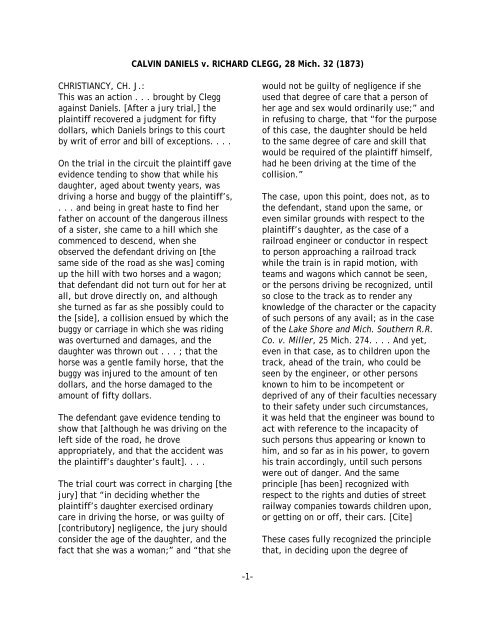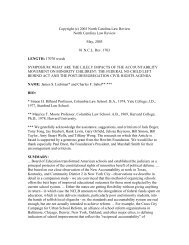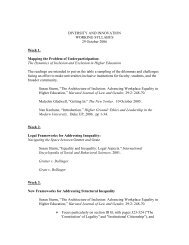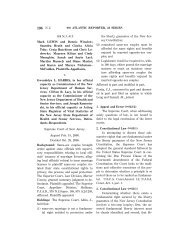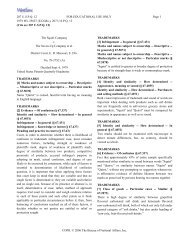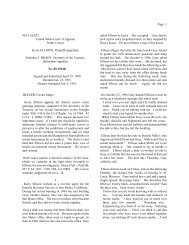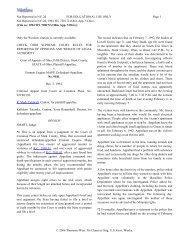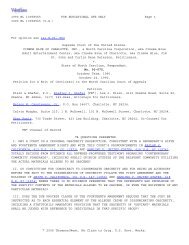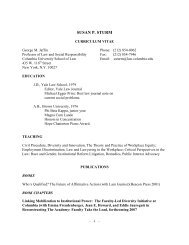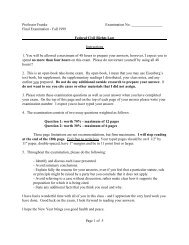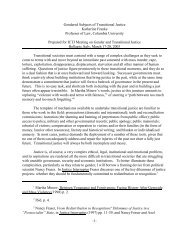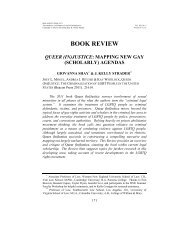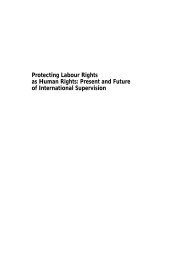-1- CALVIN DANIELS v. RICHARD CLEGG, 28 Mich. 32 (1873 ...
-1- CALVIN DANIELS v. RICHARD CLEGG, 28 Mich. 32 (1873 ...
-1- CALVIN DANIELS v. RICHARD CLEGG, 28 Mich. 32 (1873 ...
You also want an ePaper? Increase the reach of your titles
YUMPU automatically turns print PDFs into web optimized ePapers that Google loves.
<strong>CALVIN</strong> <strong>DANIELS</strong> v. <strong>RICHARD</strong> <strong>CLEGG</strong>, <strong>28</strong> <strong>Mich</strong>. <strong>32</strong> (<strong>1873</strong>)<br />
CHRISTIANCY, CH. J.:<br />
This was an action . . . brought by Clegg<br />
against Daniels. [After a jury trial,] the<br />
plaintiff recovered a judgment for fifty<br />
dollars, which Daniels brings to this court<br />
by writ of error and bill of exceptions. . . .<br />
On the trial in the circuit the plaintiff gave<br />
evidence tending to show that while his<br />
daughter, aged about twenty years, was<br />
driving a horse and buggy of the plaintiff’s,<br />
. . . and being in great haste to find her<br />
father on account of the dangerous illness<br />
of a sister, she came to a hill which she<br />
commenced to descend, when she<br />
observed the defendant driving on [the<br />
same side of the road as she was] coming<br />
up the hill with two horses and a wagon;<br />
that defendant did not turn out for her at<br />
all, but drove directly on, and although<br />
she turned as far as she possibly could to<br />
the [side], a collision ensued by which the<br />
buggy or carriage in which she was riding<br />
was overturned and damages, and the<br />
daughter was thrown out . . . ; that the<br />
horse was a gentle family horse, that the<br />
buggy was injured to the amount of ten<br />
dollars, and the horse damaged to the<br />
amount of fifty dollars.<br />
The defendant gave evidence tending to<br />
show that [although he was driving on the<br />
left side of the road, he drove<br />
appropriately, and that the accident was<br />
the plaintiff’s daughter’s fault]. . . .<br />
The trial court was correct in charging [the<br />
jury] that “in deciding whether the<br />
plaintiff’s daughter exercised ordinary<br />
care in driving the horse, or was guilty of<br />
[contributory] negligence, the jury should<br />
consider the age of the daughter, and the<br />
fact that she was a woman;” and “that she<br />
-1-<br />
would not be guilty of negligence if she<br />
used that degree of care that a person of<br />
her age and sex would ordinarily use;” and<br />
in refusing to charge, that “for the purpose<br />
of this case, the daughter should be held<br />
to the same degree of care and skill that<br />
would be required of the plaintiff himself,<br />
had he been driving at the time of the<br />
collision.”<br />
The case, upon this point, does not, as to<br />
the defendant, stand upon the same, or<br />
even similar grounds with respect to the<br />
plaintiff’s daughter, as the case of a<br />
railroad engineer or conductor in respect<br />
to person approaching a railroad track<br />
while the train is in rapid motion, with<br />
teams and wagons which cannot be seen,<br />
or the persons driving be recognized, until<br />
so close to the track as to render any<br />
knowledge of the character or the capacity<br />
of such persons of any avail; as in the case<br />
of the Lake Shore and <strong>Mich</strong>. Southern R.R.<br />
Co. v. Miller, 25 <strong>Mich</strong>. 274. . . . And yet,<br />
even in that case, as to children upon the<br />
track, ahead of the train, who could be<br />
seen by the engineer, or other persons<br />
known to him to be incompetent or<br />
deprived of any of their faculties necessary<br />
to their safety under such circumstances,<br />
it was held that the engineer was bound to<br />
act with reference to the incapacity of<br />
such persons thus appearing or known to<br />
him, and so far as in his power, to govern<br />
his train accordingly, until such persons<br />
were out of danger. And the same<br />
principle [has been] recognized with<br />
respect to the rights and duties of street<br />
railway companies towards children upon,<br />
or getting on or off, their cars. [Cite]<br />
These cases fully recognized the principle<br />
that, in deciding upon the degree of
diligence to be required of children, or<br />
other persons more or less incompetent,<br />
that incompetency must be taken into<br />
account; and no higher degree of diligence<br />
must be required of such persons than we<br />
have a right to expect, or than experience<br />
has shown such persons generally would be<br />
likely to exercise under like circumstance;<br />
and that other persons to whom that<br />
incompetency is apparent, or who know or<br />
have good reason to believe it, are bound<br />
to exercise towards such persons a<br />
correspondingly higher degree of care,<br />
according to the degree of that<br />
incompetency, so far as, under the<br />
circumstances, it may be reasonably within<br />
their power. This principle, thus limited, is<br />
one of simple justice, of common sense<br />
and common humanity, too obvious to<br />
require comment, and has often been<br />
recognized by courts in various forms.<br />
[Cites.]<br />
The charge in this case comes directly<br />
within this principle. The defendant saw<br />
the plaintiff’s daughter approaching,<br />
driving the horse and carriage. No one<br />
would ordinarily expect, and the<br />
defendant had no right to expect, from a<br />
young woman thus situated, the same<br />
amount of knowledge, skill, dexterity,<br />
steadiness of nerve, or coolness of<br />
judgment, in short the same degree of<br />
competency, which he would expect of<br />
ordinary men under like circumstances;<br />
nor, consequently, would it be just to hold<br />
her to the same high degree of care and<br />
skill. The incompetency indicated by her<br />
age or sex, – without evidence (of which<br />
there is none) of any unusual skill or<br />
experience on her part, – was less in<br />
degree, it is true, than in the case of a<br />
mere child; but the difference is in degree<br />
only, and not in principle. . . . .<br />
-2-<br />
Upon the whole case, therefore, we think<br />
the judgment should be affirmed, with<br />
costs.


